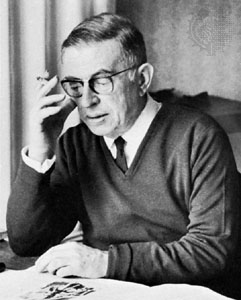
Jean-Paul
Sartre (1905-80)
French existential philosopher, dramatist, novelist, and political journalist,
author of such works as Being and Nothingness (1943; trans. 1953).
Biographies S
|
Jean-Paul
Sartre (1905-80) |
|
Ferdinand
de Saussure (1857-1913) |
|
Dorothy
Sayers (1893-1957) |
|
|
|
Friedrich
Schelling (1775-1854) |
|
Friedrich
Schiller (1759-1805) |
|
Friedrich
von Schlegel (1772-1829) |
|
Erwin
Schrödinger (1887-1961) |
|
Fritjof
Schuon (1907-1998) |
|
Albert
Schweitzer (1875-1965) |
|
Theodore
Schwenk |
|
Ridley
Scott (1937- ) |
|
George
Bernard Shaw (1856-1950) |
|
Rupert
Sheldrake (1942- ) |
|
Percy
Bysshe Shelley (1792-1822) |
|
Charles
Sherrington (1857-1952) |
|
Lev
Shestov (1866-1938) |
|
Sir
Philip Sidney (1554-1586) |
|
Angelus
Silesius (1624-77) |
|
Simplicius
(6th century A.D.) |
|
George
Gaylord Simpson (1902-1984) |
|
Huston
Smith (1919- ) |
|
Bruno
Snell (1896-1998) |
|
C. P.
Snow (1905-1980) |
|
Socrates
(470?-399? BC) |
|
Susan
Sontag (1933- ) |
|
Herbert
Spencer (1820-1903) |
|
G.
Spencer-Brown |
|
Oswald
Spengler (1880-1936) |
|
Edmund
Spenser (1552-99) |
|
Charlene
Spretnak (1946- ) |
|
Albert
Steffen (1884-1963) |
|
Gertrude
Stein (1874-1946) |
|
George
Steiner (1929- ) |
|
Wallace
Stevens (1879-1955) |
|
James
Stewart (1908-97) |
|
Ivor
Stravinsky (1882-1971) |
|
Henry
Suso (1296-1366) |
|
Emmanuel
Swedenborg (1688-1772) |